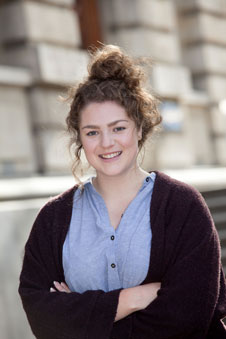
Stephanie Workman
Stephanie Workman's home town is Timaru. She always knew that Otago, with its strengths in health and biomedical sciences, was the right choice for her. Like many students, Stephanie chose Health Sciences First Year (HSFY) because of the wide choice of degree programmes that this foundation allows. It was at a HSFY Open evening that Stephanie first heard about BBiomedSc and was excited to discover that this degree provided her with the option of choosing specific papers in developmental genetics and anatomy that best suited her interests. Stephanie credits her excellent undergraduate marks to the fact that “there were no filler papers” in her degree, noting that it is far easier to get good marks when you really love your subject and that “the choice of papers available in Reproduction, Genetics & Development (REGD) is just right”.
After graduating with a BBiomedSc degree in REGD in 2016, Stephanie is now enrolled in a BBiomedSc(Hons) degree, where she is discovering just how much she loves learning new techniques and how much fun it is to have the opportunity to contribute to research discoveries in embryology. Her research topic is researching how a specific gene influences urogenital ridge development – a unique tissue that is critical to the development of the reproductive system. “The interdisciplinary nature of the BBiomedSc degree has really benefited me, as the combination of anatomy and genetics has given me a real edge in my research work”.
Choosing to commit to an Honours year was made easier when Stephanie was awarded one of the two inaugural Elizabeth Jean Trotter Honours Scholarships. “Although it didn't influence my decision on whether or not to take Honours, it has meant that financial considerations were taken out of the equation, and I can concentrate fully on my studies. I am enormously grateful to the donor for making this Scholarship available”.
Stephanie is still not sure whether she will opt for a PhD (and an eventual academic career) or whether she will instead pursue her interests in clinical embryology, but the one thing she is certain of is that her future will be people-centred and will involve developmental genetics and anatomy, pregnancy and birth.